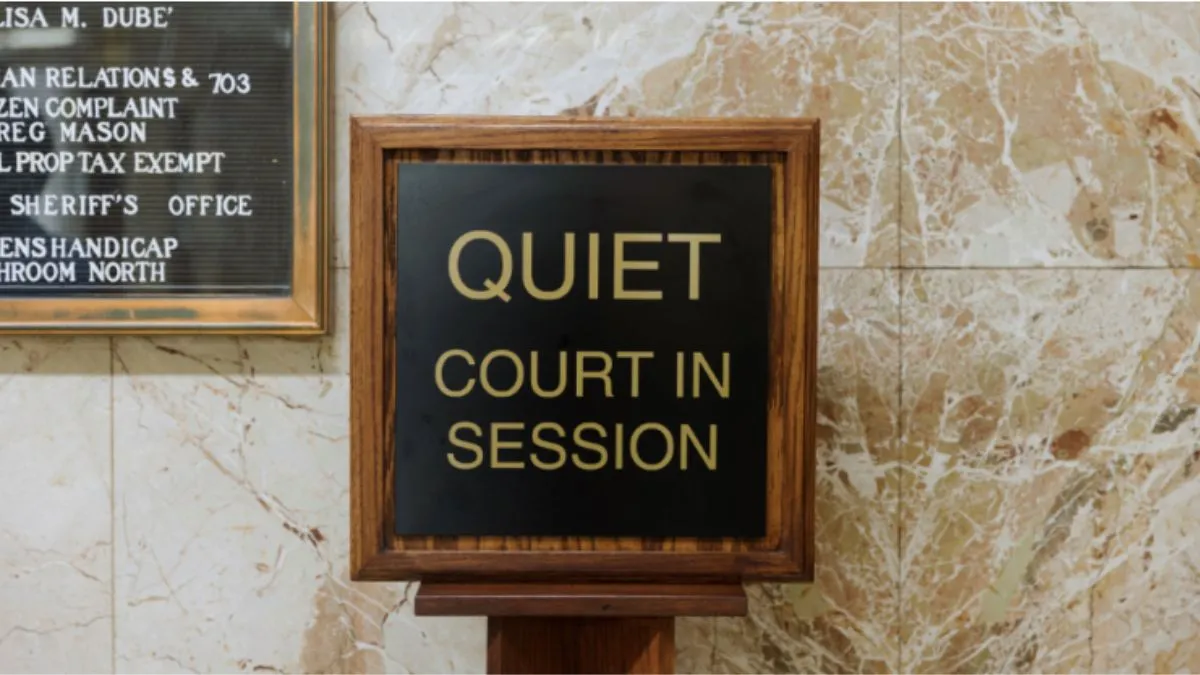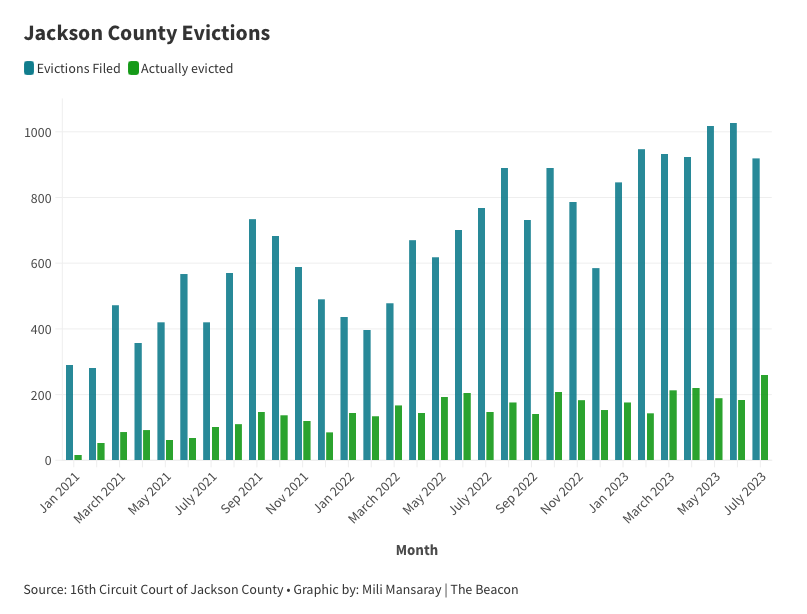
Two years after the end of a national eviction moratorium, landlords are still looking to make up for lost income. That’s led to more residents facing eviction.
Mili Mansaray, Kansas City Beacon
Jared Johnson hasn’t paid rent in four months. The trouble started when his car got towed. That cost him his job delivering groceries for Instacart.
He’s been able to hold off an eviction — for now.
At his eviction trial, his landlord agreed to give him until the end of September to pay his back rent. Johnson, who is originally from Florida, said the extension is the only thing between him and a homeless shelter or a short-term housing program.
“Or my last resort, since I won’t be able to take my dog with me, is to go back to Florida,” he said.

The U.S. Centers for Disease Control’s nationwide eviction moratorium, which began in September 2020 in response to the COVID-19 pandemic, ended in July 2021. Since then, eviction rates in Kansas City have risen back to pre-pandemic levels. In fact, efforts to evict tenants run higher now than before the pandemic.
Jackson County court records show 261 evictions in July and 1,388 so far this year. Before the pandemic and the national ban on evictions, the county saw 183 evictions in July 2019 and 1,675 evictions in the 10 months before the moratorium.
Landlords are also filing more cases to evict more tenants. More than 11,000 cases were filed from July 2022 to July 2023 in Jackson County, compared to 7,358 from June 2021 to June 2022.
To help tenants fight their cases, the Kansas City Council passed a “Right to Counsel” ordinance last year that gives free legal assistance to residents facing eviction.
One year later, the demand for representation has surpassed the supply of legal help.
“We were able to represent everyone who appeared in court when it went into effect,” said Gina Chiala, the executive director of the Heartland Center for Jobs and Freedom, an organization that provides legal services for low-wage workers and tenants. “Since then, that has changed and we’ve really started to feel the pressure.”

Why are residents getting evicted?
Rent is at the center of eviction disputes. About a third of the eviction cases filed are for rent and possession, Chiala said.
This year, the Kansas City area had the second-highest yearly increase in rent among the 50 biggest cities in the country, according to a study by Rent.com, a digital apartment marketplace.
Renters pay an average of $1,044 per month in Jackson County. Yet, as the rent rises, wages are stagnating.
Missouri’s minimum wage is $12 an hour, but the living wage for a single adult in Jackson County is $33.60, according to a living-wage calculator from the Massachusetts Institute of Technology.
“People … are just living at the edge of existence,” said Kirk McClure, professor of urban planning at the University of Kansas.
The average American renter is also rent-burned, meaning they pay more than 30% of their income on housing.
“Most low-income folks that get laid off don’t have big savings accounts to pay their rent,” McClure said. “They have a very low cushion to absorb a shock like the pandemic or a layoff.”

Lindale Lee stopped paying rent after he lost his job and his roommate moved out in July. He has since found a new job and paid it back, but he still found himself on trial due to the added fees.
“I owe $700,” he said. “But with the late fees, processing fees and attorney fees, I owe $1,402.”
The effects of the COVID-19 pandemic have also influenced landlords to raise rental costs. Many are looking to recoup the money they lost due to the national eviction moratoriums.
“Landlords were put on a huge financial crunch since they weren’t getting their rent on time. Sometimes it was paid, sometimes not,” said Michael Fortin, a lawyer who provides legal services to business owners. “Now that the moratoriums are lifted, the landlords have to raise their rents to cover their losses. … A lot of their patience is gone.”
Through federal emergency rental assistance programs, state governments distributed $2.6 billion in assistance to renters. But McClure said it took months to reach them.
He blamed out-of-state corporate property owners for the rising rents.
“We’re getting professional investors who’ve never even been to the city they’re buying in,” he said. “They’re seeing rents going up and they’re saying, ‘I want in on that.’”
The Heartland Center for Jobs and Freedom says property owners in California, New York and New Jersey evict the most tenants in Kansas City.
Can Right to Counsel handle heightening Kansas City rent?
In the 15 months since the Right to Counsel ordinance was passed, nearly 2,000 tenants have been represented by attorneys, with 86% of the rulings ending in no eviction, according to the Heartland Center’s State of Eviction report.
But as case filings rise, the organizations are losing the capacity to represent tenants.
“We are scrambling to build up staff to meet the number of evictions that are actually being filed,” said Chiala.
There are 12 attorneys between Heartland, Legal Aid of Western Missouri and the University of Missouri-Kansas City combined, each capable of handling 120 cases in a year.
The organizations want to have 18 attorneys by the spring of 2024, and they have already hired two more.
“In the meantime,” Chiala said, “we’re having to turn down cases since there’s not enough attorneys to keep up.”
Without attorneys, many tenants must defend themselves.
But a lawyer makes a sizable difference in outcome.
“A lot of times the tenants have affirmative defenses, most often because the landlord failed to maintain the property,” Chiala said. “And so we’re able to raise those defenses and then try to negotiate a humane outcome between the tenant and the landlord.”
This article is republished with permission from The Kansas City Beacon, in partnership with the KC Media Collective. The article was originally published on September 18, 2023 at https://kcbeacon.org/stories/2023/09/18/kansas-city-rent/.



















